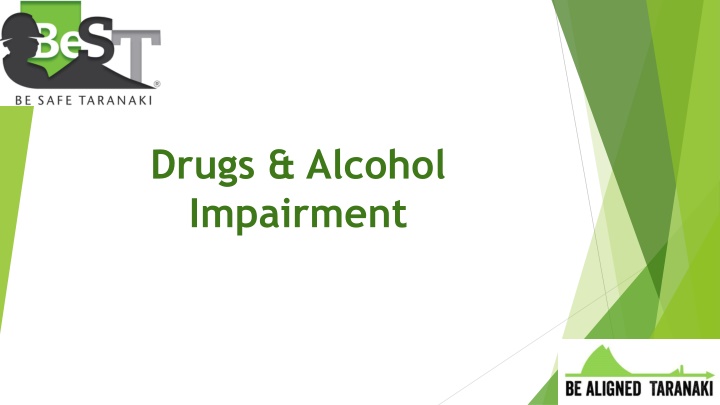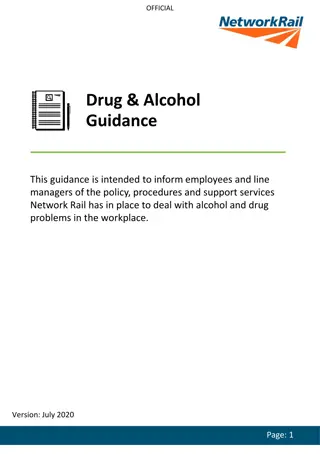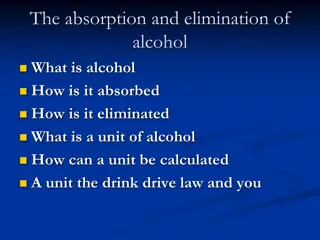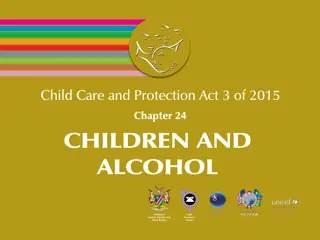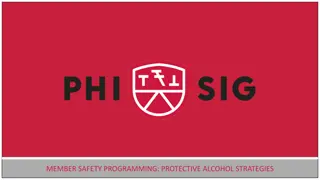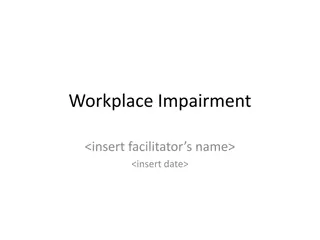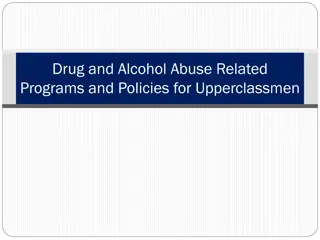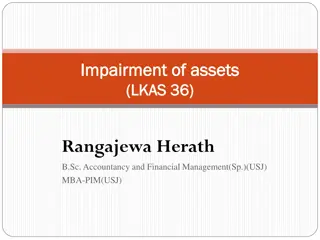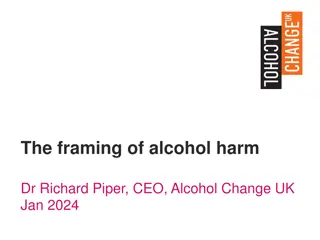Drugs & Alcohol Impairment
Factors affecting drug levels and impairment vary between individuals and include time of consumption, amount consumed, mood, health, and tolerance. Other factors like fatigue, medication, and health conditions can also cause impairment, highlighting the importance of worker safety. Absence of drugs or alcohol does not guarantee no impairment, as seen with hangovers. When dealing with an impaired worker, ensure safety first and then determine the cause. Look for signs like slurred speech, mood changes, coordination issues, and physical symptoms.
Download Presentation

Please find below an Image/Link to download the presentation.
The content on the website is provided AS IS for your information and personal use only. It may not be sold, licensed, or shared on other websites without obtaining consent from the author.If you encounter any issues during the download, it is possible that the publisher has removed the file from their server.
You are allowed to download the files provided on this website for personal or commercial use, subject to the condition that they are used lawfully. All files are the property of their respective owners.
The content on the website is provided AS IS for your information and personal use only. It may not be sold, licensed, or shared on other websites without obtaining consent from the author.
E N D
Presentation Transcript
Drugs & Alcohol Impairment
Impairment Evidence between drug levels and impairment is sparse. On top of that, effects of drugs, including alcohol, vary from person-to-person.
Factors that may affect drug levels and impairment include: Time over which drug was consumed (e.g. how many alcoholic drinks were consumed across a fixed time period) Amount of drug consumed Use of other drugs and medication General mood Body fat percentage and weight General health Tolerance to drugs and alcohol
Other Factors that can cause impairment fatigue prescribed medications pre-existing health conditions heat noise work-related stress. It is important to ensure the health and safety of the worker and those around them.
Absence of Drugs or Alcohol Absence of drugs or alcohol does not mean there is no impairment. The simplest example of this is a hangover, where perception, behaviour and reflexes are altered even if the person blows 0.000% blood alcohol concentration. This Photo by Unknown Author is licensed under CC BY-SA
What to do? If a worker appears impaired, ensure they are out of harms way and that they do not pose a risk to others. Determining reason for impairment should occur after the worker is safe.
Identifying factors of impairment Slurred speech, Unusual or varied moods, Coordination issues, reaction times, sensory perception Presence of key odours, Erratic behaviour, personality changes Frequent absenteeism or lateness especially if it is out of character, Physical signs dilated pupils, bloodshot eyes, lethargy, Irritability, Impaired judgment, perception and decision making
Training for designated staff members to approach possibly impaired workers is an important strategy to have within a workplace. Making accusations of possible causes for impairment of the worker should be avoided. tread carefully, as there may be legitimate reasons for symptoms suggesting substance abuse (e.g., red eyes or lethargic response)
approach methods If the situation allows, bring in a person who is trained in this area for help and support Draw down support from management Take the person away from the situation to a quiet confidential place Ask, ask, ask ..see if they would like a friend to sit with them through this for their support Remember do not ask a person to leave site without considering how they are able to get home.. Ensure the safety of this person.
Employee coming forward of their own volition In the absence of misconduct, supervisors should not agree with the employee that he or she has a problem, as again, supervisors are not chemical dependency specialists
Offer Support Provide information for an employer s Employee Assistance Program Ensure awareness of the Rehabilitation programme if available Supply information regarding available leave Provide information for any support groups in locality Get help to initiate a structured process for your work colleague to be able to get back to work
Drug & Alcohol Policy A robust policy will ensure that staff have good guidance and support around procedures that also includes probable and reasonable cause factors to ensure that testing can take place. The below link on our website may give you help with your Drug & Alcohol policy https://besafe.nz/drug-alcohol-protocols/
